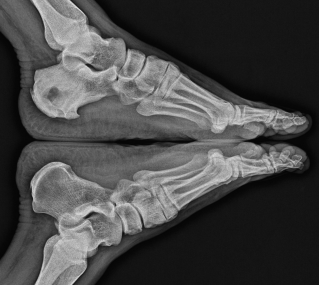Brodie’s abscess of the calcaneus is an uncommon benign lesion that has rarely been reported in the literature. This study presents a rare case of a Brodie’s abscess of the calcaneus caused by Staphylococcus aureus in an adult patient. A 46-year-old immunocompetent man had undergone nonsurgical treatment since childhood owing to the diagnosis of a heel spur. Radiological evaluation revealed a benign radiolucent cystic lesion of the calcaneus surrounded by a sclerotic rim. This condition was accompanied by perilesional bone marrow edema. Thereafter, surgical treatment was planned. During surgery, the content of the lesion was observed to be purulent. Meticulous intralesional debridement was performed, and antibiotic-loaded bone cement beads were placed. Subsequent to microbiological and pathological examinations, the cystic lesion was confirmed to be a Brodie abscess; however, direct clinical evidence of an intraosseous infection was lacking. The patient was followed up for 14 months with no complications until recovery. A Brodie abscess may mimic bone tumors. The onset of a Brodie abscess is insidious, and the clinical findings of such lesions may be obscure. A Brodie abscess of the calcaneus should be considered in the differential diagnosis of patients with chronic heel pain when suspicious radiological findings are evident.
Cite this article as: Özbek EA, Başarır K, Yıldız HY. Brodie’s abscess of the calcaneus in an adult patient. Acta Orthop Traumatol Turc 2020; 54(3): 344-7. DOI: 10.5152/j.aott.2020.02.33.



.png)
.png)

